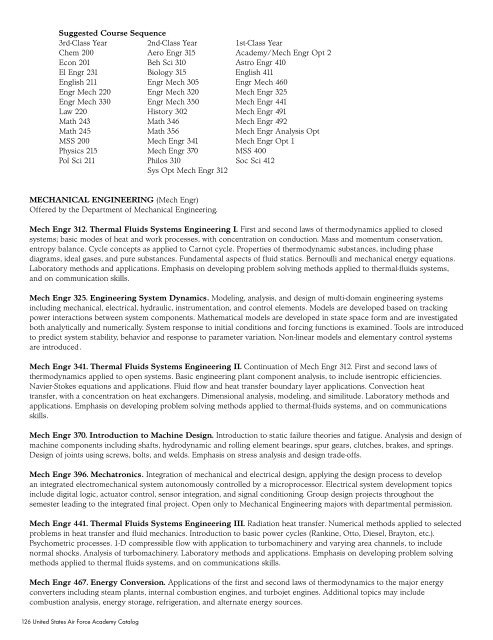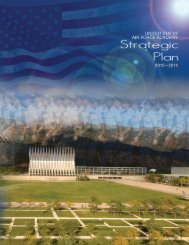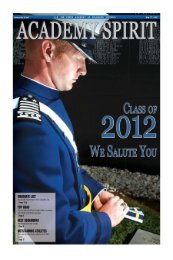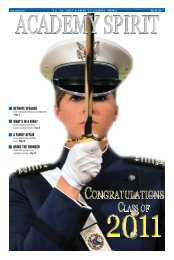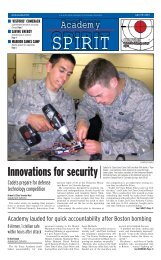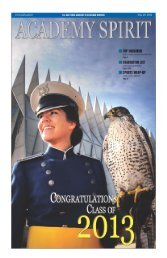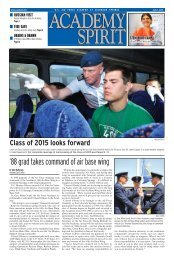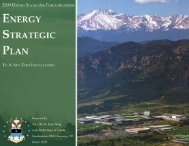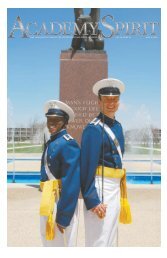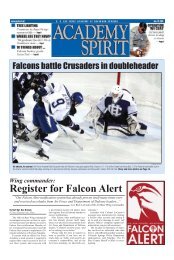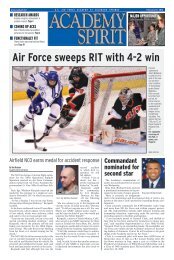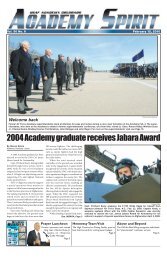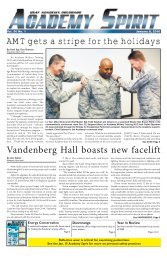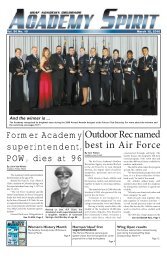2008-2009 Catalog - United States Air Force Academy
2008-2009 Catalog - United States Air Force Academy
2008-2009 Catalog - United States Air Force Academy
You also want an ePaper? Increase the reach of your titles
YUMPU automatically turns print PDFs into web optimized ePapers that Google loves.
Suggested Course Sequence<br />
3rd-Class Year 2nd-Class Year 1st-Class Year<br />
Chem 200 Aero Engr 315 <strong>Academy</strong>/Mech Engr Opt 2<br />
Econ 201 Beh Sci 310 Astro Engr 410<br />
El Engr 231 Biology 315 English 411<br />
English 211 Engr Mech 305 Engr Mech 460<br />
Engr Mech 220 Engr Mech 320 Mech Engr 325<br />
Engr Mech 330 Engr Mech 350 Mech Engr 441<br />
Law 220 History 302 Mech Engr 491<br />
Math 243 Math 346 Mech Engr 492<br />
Math 245 Math 356 Mech Engr Analysis Opt<br />
MSS 200 Mech Engr 341 Mech Engr Opt 1<br />
Physics 215 Mech Engr 370 MSS 400<br />
Pol Sci 211 Philos 310 Soc Sci 412<br />
Sys Opt Mech Engr 312<br />
Mechanical Engineering (Mech Engr)<br />
Offered by the Department of Mechanical Engineering.<br />
Mech Engr 312. Thermal Fluids Systems Engineering I. First and second laws of thermodynamics applied to closed<br />
systems; basic modes of heat and work processes, with concentration on conduction. Mass and momentum conservation,<br />
entropy balance. Cycle concepts as applied to Carnot cycle. Properties of thermodynamic substances, including phase<br />
diagrams, ideal gases, and pure substances. Fundamental aspects of fluid statics. Bernoulli and mechanical energy equations.<br />
Laboratory methods and applications. Emphasis on developing problem solving methods applied to thermal-fluids systems,<br />
and on communication skills.<br />
Mech Engr 325. Engineering System Dynamics. Modeling, analysis, and design of multi-domain engineering systems<br />
including mechanical, electrical, hydraulic, instrumentation, and control elements. Models are developed based on tracking<br />
power interactions between system components. Mathematical models are developed in state space form and are investigated<br />
both analytically and numerically. System response to initial conditions and forcing functions is examined. Tools are introduced<br />
to predict system stability, behavior and response to parameter variation. Non-linear models and elementary control systems<br />
are introduced.<br />
Mech Engr 341. Thermal Fluids Systems Engineering II. Continuation of Mech Engr 312. First and second laws of<br />
thermodynamics applied to open systems. Basic engineering plant component analysis, to include isentropic efficiencies.<br />
Navier-Stokes equations and applications. Fluid flow and heat transfer boundary layer applications. Convection heat<br />
transfer, with a concentration on heat exchangers. Dimensional analysis, modeling, and similitude. Laboratory methods and<br />
applications. Emphasis on developing problem solving methods applied to thermal-fluids systems, and on communications<br />
skills.<br />
Mech Engr 370. Introduction to Machine Design. Introduction to static failure theories and fatigue. Analysis and design of<br />
machine components including shafts, hydrodynamic and rolling element bearings, spur gears, clutches, brakes, and springs.<br />
Design of joints using screws, bolts, and welds. Emphasis on stress analysis and design trade-offs.<br />
Mech Engr 396. Mechatronics. Integration of mechanical and electrical design, applying the design process to develop<br />
an integrated electromechanical system autonomously controlled by a microprocessor. Electrical system development topics<br />
include digital logic, actuator control, sensor integration, and signal conditioning. Group design projects throughout the<br />
semester leading to the integrated final project. Open only to Mechanical Engineering majors with departmental permission.<br />
Mech Engr 441. Thermal Fluids Systems Engineering III. Radiation heat transfer. Numerical methods applied to selected<br />
problems in heat transfer and fluid mechanics. Introduction to basic power cycles (Rankine, Otto, Diesel, Brayton, etc.).<br />
Psychometric processes. 1-D compressible flow with application to turbomachinery and varying area channels, to include<br />
normal shocks. Analysis of turbomachinery. Laboratory methods and applications. Emphasis on developing problem solving<br />
methods applied to thermal fluids systems, and on communications skills.<br />
Mech Engr 467. Energy Conversion. Applications of the first and second laws of thermodynamics to the major energy<br />
converters including steam plants, internal combustion engines, and turbojet engines. Additional topics may include<br />
combustion analysis, energy storage, refrigeration, and alternate energy sources.<br />
126 <strong>United</strong> <strong>States</strong> <strong>Air</strong> <strong>Force</strong> <strong>Academy</strong> <strong>Catalog</strong>


